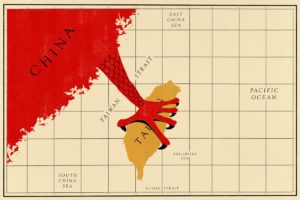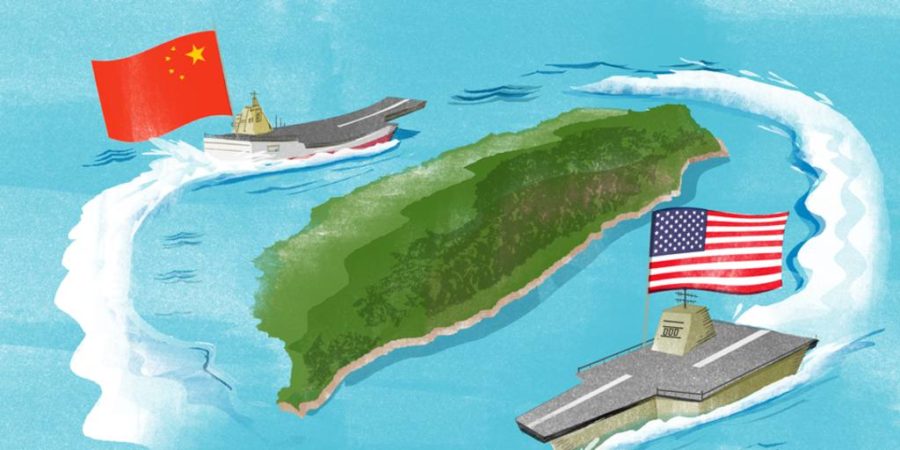Note: In this article, interviewees requested to remain anonymous due to safety concerns and privacy. Therefore they are only referred to their last name.
The tension between China and Taiwan has been around for centuries. However, most U.S. citizens do not know the history and importance behind the conflict. The lives of Americans of Chinese and Taiwanese descent will change if the U.S. supports Taiwan if China brings in the military and begins a war for land.
What’s the history?
In 1949 the Communist party — the People’s Republic of China — gained control of mainland China forcing the Republic of China (ROC) to retreat to Taiwan during the China Civil War. The People’s Republic of China is the political party in mainland China, and the Republic of China is the political party in Taiwan. Taiwan, a democracy, is still considered a part of mainland China by the Chinese government. Taiwan has its own president, government, currency, military, passport, and language. The main reason for the conflict is the debate about whether or not Taiwan is a part of China.
The current Taiwanese president, Tsai Ing-wen, made a public speech confirming she wants Taiwan to be independent and not pressured by China. In a recent interview, she stated that the threat from China is increasing every day and confirmed the presence of U.S. troops in Taiwan.
What is the conflict?
Pro-Taiwan Independence citizens believe that China is holding Taiwan back on the political side. They want Taiwan to leave China altogether and be its own country. On the other hand, China thinks that Taiwan is a part of China. They see Taiwan as a breakaway province and are currently trying to retake it.

How is this affecting citizens in Taiwan and China?
A March 2021 opinion poll commissioned by the Taiwanese government shows that currently the majority of Taiwanese support the DPP government’s approach in “safeguarding national sovereignty.” More and more people also say they feel Taiwanese rather than Chinese.
However, most regular Taiwanese citizens do not feel a significant impact on their lives right now and are not too concerned about the conflict.
“Actually, there isn’t much [impact]. For a long time, Taiwan and China’s overall lifestyle have had a big difference, so it would be difficult to unite unless the essentials were more similar,” Sandy Wu, a Taiwanese music teacher, said. “Personally, I would want Taiwan to be independent because we already had our own [political system] and lives, but China lives with a political system and lifestyle that we are not used to.”
The U.S. gets involved
In October, U.S. President Joe Biden commented in a press conference on the U.S. defending Taiwan from a Chinese attack.
“Yes. Yes, we have a commitment to do that,” Biden said. “The Taiwan Relations Act of 1979 states that the U.S. is committed to providing Taiwan with arms for its defense, though the law does not commit the U.S. to send troops to Taiwan to defend it.”
Recently Taiwanese President Tsai Ing-wen confirmed that American troops have been training the Taiwanese military. However, the number of troops is unclear.

For many Taiwanese, the paranoia of U.S. interference stems from hidden agendas.
“A considerable percentage of Taiwanese hold suspicion [towards] U.S. [intentions]. That is to say, the U.S. policy toward Taiwan is based on U.S. interests. The U.S. will still betray Taiwan when it wants to,” Ms. Cai, a Taiwanese citizen said. “For supporters of Taiwan’s independence, U.S. solidarity and support is positive for the independence movement, but still believes that the future of Taiwan ultimately requires self-determination by the people of Taiwan. As for the Chinese, their position has always been that the United States interferes in their internal affairs.”
Taiwanese citizens don’t completely trust Biden and the U.S.’s word for help because the U.S. is most likely offering help for their own interest and can back out anytime. They believe that because of past experiences with other international affairs.
“[The U.S.] backed out from the Vietnam war after aiding the fight … in the recent event, they also pulled troops out of Afghanistan after 20 years,” Mister Chen, a Taiwan citizen, said. “The U.S. left before the conflict was over even with all their political and military power and would leave them alone to deal with it.”
Hong Kong, a possible future for Taiwan?
Hong Kong, a province of China, was revoked of its privilege of self-government in recent years. It started during 2019, where a social movement and people rioted into the Legislative Council with their Five Demands of Strike. Rioters blocked the streets with traffic and damaged and looted public properties and subways for a long time. These rioters and their leaders from 2019 were encouraged and financially supported by foreign influence and penetrated the upper education system to appeal to the younger generation to do their bidding. They also occupied Universities as their center. During that time, some children didn’t go back to school for safety. It lasted for about half a year until legislation added the National Security Law. This National Security Law was enforced for those who destroy the national flag, defame or disrespect the country with propaganda, and damage public property during riots.
However, those council members (ones that were elected during democracy) who committed crimes against the National Security Law have been removed from the House. Now, there are only pro-China congressmen left to assure governmental control and damage control. Only some special committees in the district councils and functional constituencies get to vote for the Chief Executive of Hong Kong. In Hong Kong, it’s encouraged to vote for your district councilor because this is the only part you can participate in and choose who will represent your district. Whether you choose the establishment party or a democratic party, from the pro-China party.

(Hong Kong is still a self-government district, which complies with the Basic Law, and does not follow the laws of mainland China. The only difference for these past two years was the addition of the National Security Law. If someone acts as a violation of the national security ordinance, they will be detained with no trial or court representation.)
“The majority of Hong Kong people are very content with being part of China. This is a national issue to be decided exclusively by the Chinese government,” Chris Yu, a Hong Kong resident stated. “Generally speaking, Hong Kong is an integral inalienable part of China. Of course, the majority would like to see Taiwan being unified so there could be more seamless collaboration under one roof. Since the handover back to China, Hong Kong has flourished and turned into an extremely successful international financial hub. Hong Kong has proven the One Country Two System works, and they can be a role model for Taiwan.”
What happens if there is a war?
With all the conflicts and tension, there is talk of a war between China and Taiwan. China flies military planes into Taiwan territories to test and warn Taiwan. H-6 bombers, fighter jets, J-16 fighters, and military planes have flown into Taiwan’s airzone for more than a year. At the beginning of October, a record number of almost 150 Chinese aircraft was sent into the defensive territory.

“In only terms of the war between the two countries, Taiwan’s military power will certainly not be able to defeat China. However, we all know that war is usually not a matter between the two countries,” Guo, a Taiwan citizen, said. “If [Taiwan gets] international aid or China’s internal problems become fierce, perhaps Taiwan still has a chance to survive.”
For some who have family in mainland China and Taiwan, picking a side is not an option.
“If there’s a war, people like me cannot survive as I have family in both Taiwan and in Shanghai,” Woodside Mandarin teacher Yihui Xu stated. “So I feel like as long as they keep everyone safe, I don’t think many people would care if we are a part of China or if we are independent Taiwan.”
Taiwan citizens also believe that Taiwan is at a disadvantage because it’s an island and can be attacked from all sides. Still, China also has disadvantages that may give Taiwan a chance.
“Due to the surrounding international ground and [China’s] internal instability, I have confidence in Taiwan,” Cai said.
Others say that no matter which side is more powerful and has advantages, a war is harmful to all sides and will not benefit anyone.
“No one will succeed if a war begins,” Mr. Wu, a Taiwanese citizen, said.






